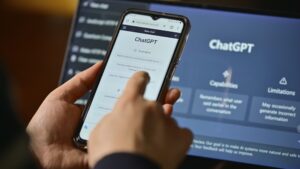OpenAI has launched a powerful new AI assistant feature for ChatGPT that allows users to delegate everyday tasks like browsing the web, making restaurant reservations, and shopping online—marking a major leap in AI’s ability to act, not just analyse.
The new ChatGPT agent, available from this week to users on paid “pro”, “plus”, and “teams” plans, gives the chatbot autonomy to interact with files, browsers, calendars, and software such as spreadsheets and presentations. However, it will not launch in the EU for now, and the company has acknowledged that the enhanced capabilities bring heightened risks.
In a blog post announcing the update, OpenAI said: “The model not only thinks but also acts.”
The rollout follows similar initiatives from Google and Anthropic, as AI firms race to release “agents”—systems capable of handling multi-step computer-based tasks with limited human oversight. These assistants can complete everything from planning travel to organising documents or conducting online research, and are designed to toggle between systems to get jobs done efficiently.
While the new assistant promises greater convenience, OpenAI has been transparent about the potential dangers of granting an AI model active control. The company confirmed that the agent will always seek user permission before taking any irreversible or consequential action, such as making purchases or deleting files.
“You’re always in control,” the company said. “ChatGPT requests permission before taking actions of consequence, and you can easily interrupt, take over the browser, or stop tasks at any point.”
As part of its safety strategy, OpenAI has introduced guardrails to prevent misuse, including malicious prompts hidden on websites and suspicious instructions like bank transfers. The system has also been trained to reject tasks that could lead to security breaches or biohazard creation, despite no current evidence that the model is capable of facilitating such harm.
In a live demonstration, the AI was asked to scan a user’s Google Calendar for a free evening, search for restaurants rated 4.3 stars or higher across several cuisines, and return options—all within 10 to 15 minutes. Users can pause, redirect, or clarify instructions mid-task, mirroring a human assistant experience.
While the tool is aimed at productivity and convenience, it has also sparked speculation about commercial applications, such as earning commission through retail recommendations or checkout links.
OpenAI CEO Sam Altman has previously floated the idea of charging a 2% fee on transactions generated through the company’s “deep research” services.
However, OpenAI said the current assistant does not include ads, sponsored placements, or paid product recommendations, and there are no plans to introduce them.
Independent analysts have raised concerns over how future AI assistants might prioritise results. Niamh Burns, a senior media analyst at Enders Analysis, said:
“It’s easy to say the system will require your approval before making a purchase, but what goes into the process of that system finding the products? Would brands be able to pay for visibility in results?”
As AI companies look to monetise and differentiate their services, pressure is mounting to balance utility, ethics, and trust.
The ChatGPT agent is currently available only to subscribers of OpenAI’s paid plans, positioning it as a premium productivity tool for professionals, teams, and power users.
Its launch signals a shift in AI development—from reactive models that provide information, to proactive assistants capable of completing real-world tasks autonomously.
But as OpenAI pushes boundaries, it also opens the door to greater regulatory scrutiny and the need for clear user transparency. The AI assistant may soon be able to do more than draft an email—it could also be making decisions on your behalf.
For now, OpenAI’s message is clear: the user stays in control. But as agents grow more capable, the world will be watching how they are used—and who ultimately benefits.
